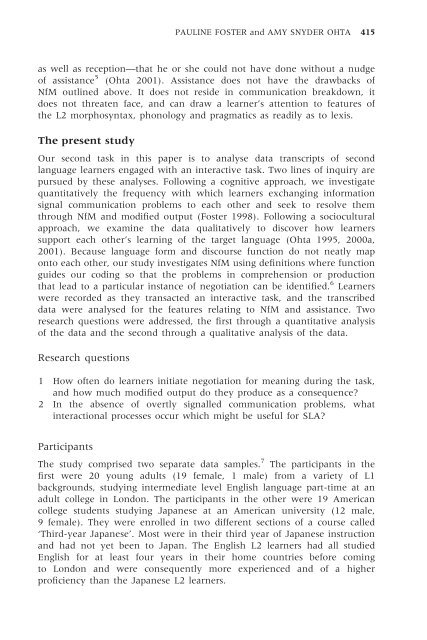Negotiation for Meaning and Peer Assistance in Second Language ...
Negotiation for Meaning and Peer Assistance in Second Language ...
Negotiation for Meaning and Peer Assistance in Second Language ...
Create successful ePaper yourself
Turn your PDF publications into a flip-book with our unique Google optimized e-Paper software.
PAULINE FOSTER <strong>and</strong> AMY SNYDER OHTA 415<br />
as well as reception—that he or she could not have done without a nudge<br />
of assistance 5 (Ohta 2001). <strong>Assistance</strong> does not have the drawbacks of<br />
NfM outl<strong>in</strong>ed above. It does not reside <strong>in</strong> communication breakdown, it<br />
does not threaten face, <strong>and</strong> can draw a learner’s attention to features of<br />
the L2 morphosyntax, phonology <strong>and</strong> pragmatics as readily as to lexis.<br />
The present study<br />
Our second task <strong>in</strong> this paper is to analyse data transcripts of second<br />
language learners engaged with an <strong>in</strong>teractive task. Two l<strong>in</strong>es of <strong>in</strong>quiry are<br />
pursued by these analyses. Follow<strong>in</strong>g a cognitive approach, we <strong>in</strong>vestigate<br />
quantitatively the frequency with which learners exchang<strong>in</strong>g <strong>in</strong><strong>for</strong>mation<br />
signal communication problems to each other <strong>and</strong> seek to resolve them<br />
through NfM <strong>and</strong> modified output (Foster 1998). Follow<strong>in</strong>g a sociocultural<br />
approach, we exam<strong>in</strong>e the data qualitatively to discover how learners<br />
support each other’s learn<strong>in</strong>g of the target language (Ohta 1995, 2000a,<br />
2001). Because language <strong>for</strong>m <strong>and</strong> discourse function do not neatly map<br />
onto each other, our study <strong>in</strong>vestigates NfM us<strong>in</strong>g def<strong>in</strong>itions where function<br />
guides our cod<strong>in</strong>g so that the problems <strong>in</strong> comprehension or production<br />
that lead to a particular <strong>in</strong>stance of negotiation can be identified. 6 Learners<br />
were recorded as they transacted an <strong>in</strong>teractive task, <strong>and</strong> the transcribed<br />
data were analysed <strong>for</strong> the features relat<strong>in</strong>g to NfM <strong>and</strong> assistance. Two<br />
research questions were addressed, the first through a quantitative analysis<br />
of the data <strong>and</strong> the second through a qualitative analysis of the data.<br />
Research questions<br />
1 How often do learners <strong>in</strong>itiate negotiation <strong>for</strong> mean<strong>in</strong>g dur<strong>in</strong>g the task,<br />
<strong>and</strong> how much modified output do they produce as a consequence?<br />
2 In the absence of overtly signalled communication problems, what<br />
<strong>in</strong>teractional processes occur which might be useful <strong>for</strong> SLA?<br />
Participants<br />
The study comprised two separate data samples. 7 The participants <strong>in</strong> the<br />
first were 20 young adults (19 female, 1 male) from a variety of L1<br />
backgrounds, study<strong>in</strong>g <strong>in</strong>termediate level English language part-time at an<br />
adult college <strong>in</strong> London. The participants <strong>in</strong> the other were 19 American<br />
college students study<strong>in</strong>g Japanese at an American university (12 male,<br />
9 female). They were enrolled <strong>in</strong> two different sections of a course called<br />
‘Third-year Japanese’. Most were <strong>in</strong> their third year of Japanese <strong>in</strong>struction<br />
<strong>and</strong> had not yet been to Japan. The English L2 learners had all studied<br />
English <strong>for</strong> at least four years <strong>in</strong> their home countries be<strong>for</strong>e com<strong>in</strong>g<br />
to London <strong>and</strong> were consequently more experienced <strong>and</strong> of a higher<br />
proficiency than the Japanese L2 learners.














